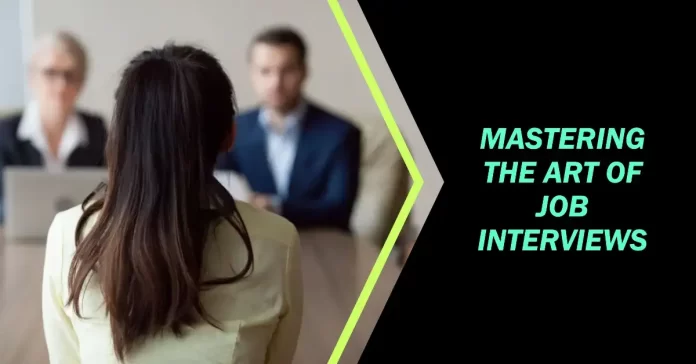We will examine the common mistakes that candidates often make during job interviews and provide practical tips to help them navigate these challenges. By understanding and avoiding these pitfalls, You can significantly enhance your interview performance and increase your likelihood of securing your dream job.
Here Are The 10 Common Job Interviews Mistakes to Avoid
Failing to research the company and position
Highlight the importance of conducting thorough research on the company and the role you are applying for. Provide tips and gather information about the company’s mission, values, culture, and recent news or projects.Lacking preparation for commonly asked questions
Discuss common interview questions and guide how to prepare responses. Include tips on structuring your answers, using specific examples, and showcasing relevant skills and experiences.Overlooking non-verbal communication cues
Explore the significance of non-verbal communication during job interviews, such as body language, eye contact, and facial expressions. Offer advice on how to project confidence, professionalism, and engagement through non-verbal cues.Inadequate knowledge of job requirements
Highlight the significance of industry knowledge and job-specific requirements, and offer practical suggestions on researching industry trends, job descriptions, and qualifications. Gain valuable insights to showcase your expertise and suitability for the role.Being too generic in your answers
Explain the risk of providing generic cliché answers during interviews and encourage candidates to provide unique and specific responses that differentiate them from other applicants. Offer tips on personalizing your answer and highlighting your strengths.Talking too much or not enough
Discuss the balance between providing comprehensive answers and being concise during interviews. Provide strategies for structuring your responses and effectively communicating your qualifications without rambling or incomplete answers.Not asking thoughtful questions
Stress the importance of asking questions at the end of the interview to demonstrate your interest and engagement. Suggest some relevant questions about the company, the role, and the team to showcase your curiosity and enthusiasm.Neglecting to showcase your accomplishments
Encourage candidates to highlight their achievements and successes during the interview. Discover expert guidance on effectively framing achievements and demonstrating them to prospective employers.Not addressing weaknesses or gaps in your resume
Addressing any weaknesses is crucial in presenting yourself as a strong and capable candidate. Provide tips on these areas honestly and emphasize your willingness to learn and grow.Failing to follow up after the interview
Highlight the importance of sending a follow-up note or email to express gratitude and reaffirm your interest in the position. Show the hiring team your professionalism and eagerness to move forward. Crafting a professional and personalized follow-up message is an essential skill in effective communication
Conclusion
You can approach job interviews with greater confidence and increase your chances of making a positive impression on potential employers by recognizing and avoiding these common mistakes. Remember, thorough preparation and effective communication are keys to mastering the art of job interviews.
The Dos and Don’ts of Body Language in Job Interviews
Dos
- Maintain good posture: Sit or stand up straight to convey confidence and attentiveness.
- Make eye contact: Establish and maintain eye contact with the interviewer to show interest and engagement.
- Smile genuinely: Display a warm and friendly smile to create a positive and approachable impression.
- Use appropriate hand gestures: Use natural and purposeful hand gestures to enhance your verbal communication.
- Mirror the interviewer’s body language: Subtly match the interviewer’s body language to establish rapport and connection.
- Lean slightly forward: Lean slightly towards the interviewer to show interest and active participation in the conversation.
- Nod and display active listening: Demonstrate active listening by nodding, using facial expressions, and responding appropriately.
- Maintain open and confident body language: Avoid crossing your arms or legs, as it can appear defensive. Keep your body language open and poised.
Don’ts
- Avoid excessive fidgeting: Minimize fidgetings, such as tapping your fingers or bouncing your leg, as it can indicate nervousness or lack of focus.
- Don’t slouch or appear too relaxed: Slouching or appearing too comfortable can create the impression of disinterest or a lack of professionalism.
- Avoid excessive hand gestures: While hand gestures can be effective, avoid using excessive or distracting movements that may divert attention from your message.
- Don’t invade personal space: Respect the interviewer’s personal space and maintain an appropriate distance during the interview.
- Avoid avoiding eye contact: Lack of eye contact can indicate a lack of confidence. Therefore, it is crucial to maintain consistent eye contact throughout the interview to convey attentiveness and positivity.
- Don’t display negative facial expressions: Avoid displaying negative facial expressions, such as frowning or rolling your eyes, as it can create a negative impression.
- Refrain from touching your face or hair excessively: Excessive touching of your face or hair can be distracting and may convey nervousness or a lack of confidence.











